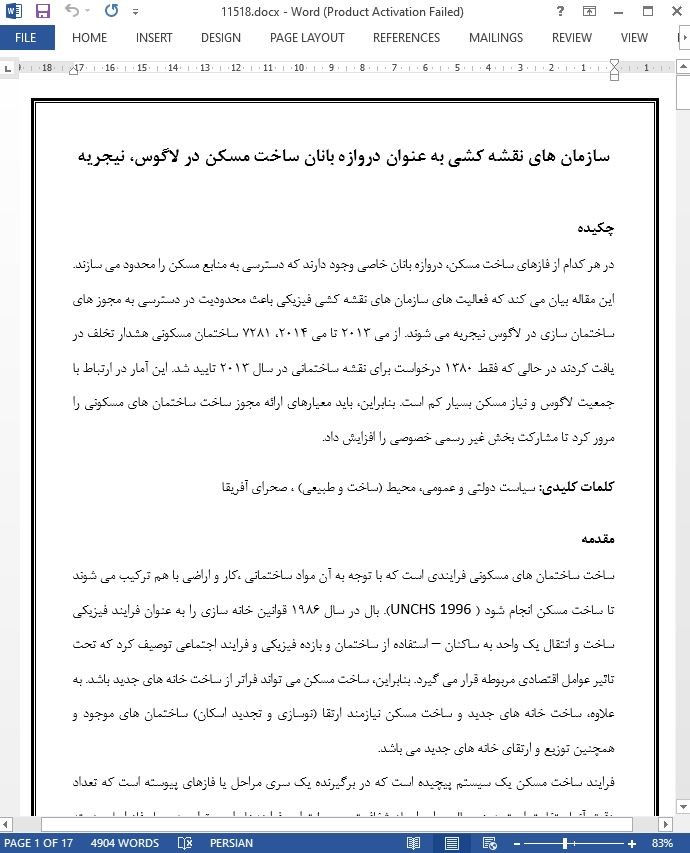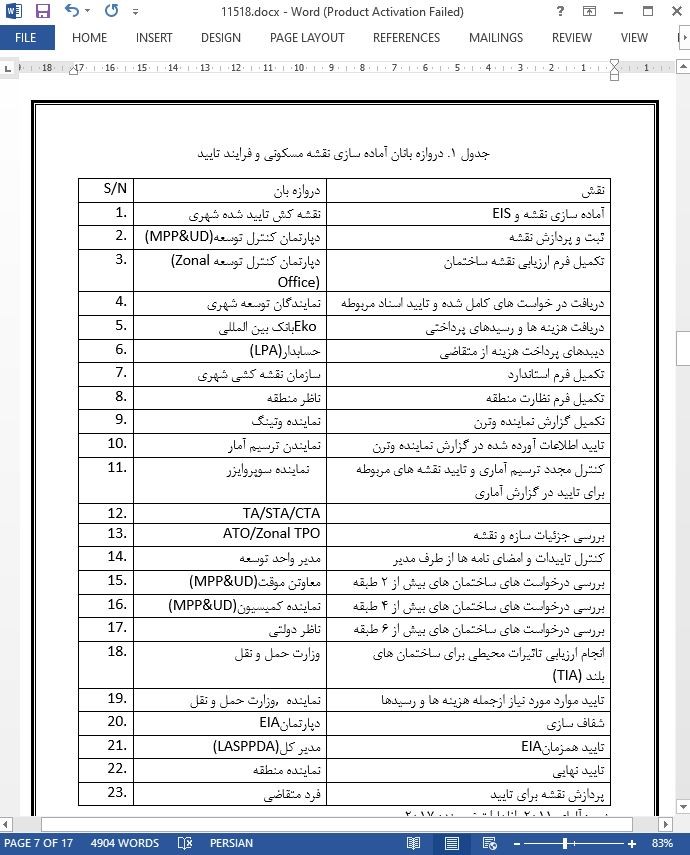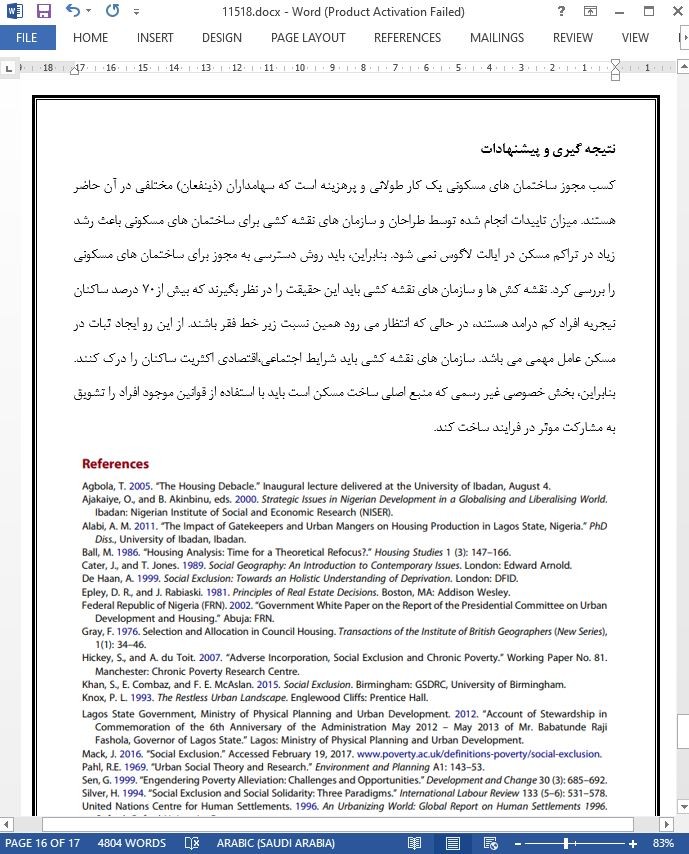
سازمان های نقشه کشی به عنوان دروازه بانان ساخت مسکن در لاگوس، نیجریه
چکیده
در هر کدام از فازهای ساخت مسکن، دروازه بانان خاصی وجود دارند که دسترسی به منابع مسکن را محدود می سازند. این مقاله بیان می کند که فعالیت های سازمان های نقشه کشی فیزیکی باعث محدودیت در دسترسی به مجوز های ساختمان سازی در لاگوس نیجریه می شوند. از می 2013 تا می 2014، 7281 ساختمان مسکونی هشدار تخلف در یافت کردند در حالی که فقط 1380 درخواست برای نقشه ساختمانی در سال 2013 تایید شد. این آمار در ارتباط با جمعیت لاگوس و نیاز مسکن بسیار کم است. بنابراین، باید معیارهای ارائه مجوز ساخت ساختمان های مسکونی را مرور کرد تا مشارکت بخش غیر رسمی خصوصی را افزایش داد.
مقدمه
ساخت ساختمان های مسکونی فرایندی است که با توجه به آن مواد ساختمانی ،کار و اراضی با هم ترکیب می شوند تا ساخت مسکن انجام شود (UNCHS 1996 ). بال در سال 1986 قوانین خانه سازی را به عنوان فرایند فیزیکی ساخت و انتقال یک واحد به ساکنان – استفاده از ساختمان و بازده فیزیکی و فرایند اجتماعی توصیف کرد که تحت تاثیر عوامل اقتصادی مربوطه قرار می گیرد. بنابراین، ساخت مسکن می تواند فراتر از ساخت خانه های جدید باشد. به علاوه، ساخت خانه های جدید و ساخت مسکن نیازمند ارتقا (نوسازی و تجدید اسکان) ساختمان های موجود و همچنین توزیع و ارتقای خانه های جدید می باشد.
نتیجه گیری و پیشنهادات
کسب مجوز ساختمان های مسکونی یک کار طولانی و پرهزینه است که سهامداران (ذینفعان) مختلفی در آن حاضر هستند. میزان تاییدات انجام شده توسط طراحان و سازمان های نقشه کشی برای ساختمان های مسکونی باعث رشد زیاد در تراکم مسکن در ایالت لاگوس نمی شود. بنابراین، باید روش دسترسی به مجوز برای ساختمان های مسکونی را بررسی کرد. نقشه کش ها و سازمان های نقشه کشی باید این حقیقت را در نظر بگیرند که بیش از70 درصد ساکنان نیجریه افراد کم درامد هستند، در حالی که انتظار می رود همین نسبت زیر خط فقر باشند. از این رو ایجاد ثبات در مسکن عامل مهمی می باشد. سازمان های نقشه کشی باید شرایط اجتماعی،اقتصادی اکثریت ساکنان را درک کنند. بنابراین، بخش خصوصی غیر رسمی که منبع اصلی ساخت مسکن است باید با استفاده از قوانین موجود افراد را تشویق به مشارکت موثر در فرایند ساخت کند.
ABSTRACT
In every phase of housing production, there are certain “gatekeepers” that constrain access to housing resources. This article argues that the activities of physical planning institutions constrain access to residential building permits in Lagos, Nigeria. From May 2013 to May 2014, 7,281 residential structures were served with contravention notices while only 1,380 applications for residential building plans were approved in 2013. This figure is negligible in relation to the population of Lagos and its housing needs. There is therefore a need to review the criteria for granting residential building permits to encourage participation from the informal private sector.
Introduction
Residential housing production is the process by which building materials, labour, and land are combined to become housing (UNCHS 1996). Ball (1986) defines housing provision as the physical process of creating and transferring a dwelling to its occupiers, its subsequent use and physical reproduction, and at the same time a social process dominated by the economic interests involved. Housing production can, therefore, be said to encompass more than the production of new houses. In addition to the construction of new housing, housing production also entails upgrading (i.e. renovation and rehabilitation) of the existing dwellings, as well as the distribution of new and upgraded houses.
Conclusion and recommendations
Obtaining a residential building permit is a long and expensive task and involves several stakeholders. The rate at which planners and planning institutions are granting approval to applications for residential building permits will not lead to significant growth in housing delivery in Lagos State. There is therefore a need to review the procedure for granting access to residential building permits. Planners and planning institutions need to take into consideration the fact that over 70% of Nigerians are low-income earners, while about the same proportion are believed to be below the poverty line. This is vital to enable self-help housing to be sustained. Planning institutions should recognise the socio-economic condition of the majority of Lagos residents. Therefore, the informal private sector, which is the main source of housing production in the state, should be encouraged using enabling laws to participate effectively in the housing production process.
چکیده
مقدمه
اتصال مفهومی: مفهوم محرومیت
موقعیت: ایالت لاگوس
مواد و روش ها
بحث در مورد نتایج
فعالان کلیدی در فرایند تایید ساختمان های مسکونی
نیازهای اصلی دریافت تایید مجوز ساختمان های مسکونی
طراحان و سازمان های نقشه کشی به عنوان دروازه بان در فرایند تائید ساختمان های مسکونی
نتیجه گیری و پیشنهادات
ABSTRACT
Introduction
Conceptual anchor: the concept of social exclusion
The context: Lagos State
Materials and methods
Discussion of findings
Key actors in residential building approval process
Basic requirements for granting residential building approval permits
Planners and planning institutions as gatekeepers in residential building approval process
Conclusion and recommendations
- اصل مقاله انگلیسی با فرمت ورد (word) با قابلیت ویرایش
- ترجمه فارسی مقاله با فرمت ورد (word) با قابلیت ویرایش، بدون آرم سایت ای ترجمه
- ترجمه فارسی مقاله با فرمت pdf، بدون آرم سایت ای ترجمه



